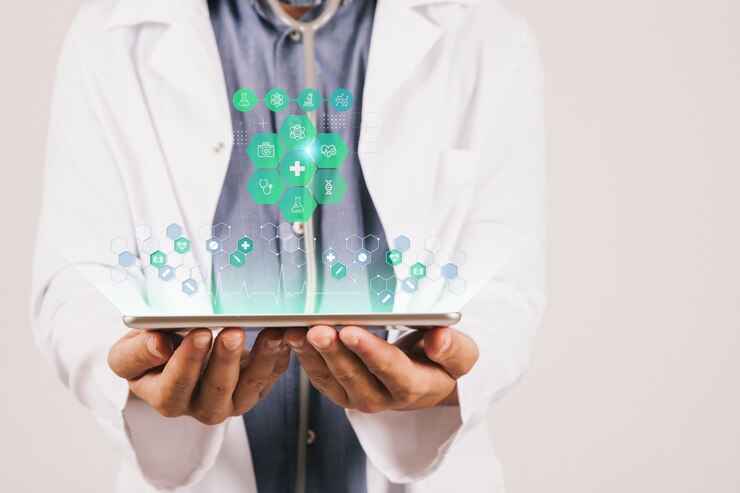Introduction
Imagine a world where your smartphone could predict a medical emergency or guide you through personalized health tips—all in real-time. Sounds futuristic, right? Well, that’s the power of AI-driven mobile applications in healthcare. With artificial intelligence (AI) becoming an integral part of our lives, healthcare is undergoing a revolutionary shift, enabling smarter, more efficient, and personalized care. Let’s dive into how AI-powered mobile apps are reshaping healthcare and what challenges they bring along.
What Are AI-Powered Mobile Apps?
AI-powered mobile apps use artificial intelligence to analyze data, learn patterns, and provide insights or solutions in real-time. These apps leverage machine learning, natural language processing, and computer vision to simplify complex healthcare processes.
The Role of AI in Healthcare
AI in healthcare acts like a digital assistant that never sleeps. From analyzing medical records to aiding in surgery, AI optimizes efficiency and minimizes human errors. Mobile apps bring this technology to our fingertips, making healthcare accessible to everyone.
Benefits of AI in Healthcare Apps
1. Personalized Patient Care
Imagine a virtual health coach that knows you better than you know yourself. AI-powered apps analyze your habits, lifestyle, and medical history to offer tailored recommendations. Whether it’s a diet plan, exercise regime, or medication reminder, these apps make healthcare personal.
2. Enhanced Diagnostics and Accuracy
Doctors are great, but even they can’t remember everything. AI apps assist by analyzing vast amounts of medical data, flagging anomalies, and suggesting possible diagnoses. This not only speeds up the process but reduces errors.
3. Remote Monitoring and Telehealth
Do you dread hospital visits? AI apps enable remote consultations and monitoring, allowing patients to receive care from the comfort of their homes. It’s like having a doctor on call 24/7.
The Role of Data in AI Healthcare Apps
AI thrives on data—the more, the better. Mobile apps collect data from wearables, user inputs, and medical records to continuously learn and improve their recommendations. However, managing this data responsibly is critical.
Challenges of AI in Mobile Healthcare
1. Privacy and Data Security Concerns
Sharing sensitive health data isn’t easy for everyone. What if it gets hacked or misused? Ensuring robust encryption and compliance with regulations like HIPAA is essential.
2. Integration Challenges in Legacy Systems
Healthcare isn’t exactly famous for its cutting-edge tech infrastructure. Integrating AI apps with existing systems can be a daunting task, requiring significant time and resources.
The Role of a Mobile App Development Company in Riyadh
Creating an effective AI-powered healthcare app requires expertise. A mobile app development company in Riyadh can bring local insights and technical expertise to craft apps tailored to specific needs, ensuring both functionality and compliance.
Future Trends in AI-Powered Healthcare
The future of AI in healthcare looks promising with advancements in predictive analytics, conversational AI, and virtual reality. We’re moving towards a world where healthcare isn’t just reactive but proactive.
Real-World Examples of AI in Action
- Babylon Health: An app that provides AI-driven health consultations.
- Ada Health: A symptom-checking app using AI to suggest possible conditions.
- MyFitnessPal: AI-powered insights for fitness and diet tracking.
How to Get Started with AI in Healthcare
Start small. Identify the challenges your healthcare organization faces, and consult with experts. Partnering with a mobile app development company in Riyadh can simplify the journey by providing end-to-end solutions.
Conclusion
AI-powered mobile apps are revolutionizing healthcare by making it more accessible, accurate, and personalized. While challenges like data security and integration remain, the benefits far outweigh the drawbacks. The healthcare industry’s future lies in leveraging technology, and there’s no better time than now to embrace it.
FAQs
1. How do AI-powered apps improve healthcare?
AI-powered apps enhance healthcare by offering personalized care, improving diagnostic accuracy, and enabling remote monitoring.
2. Are AI-powered apps secure?
Yes, if they follow strict encryption protocols and comply with regulations like HIPAA. Security should always be a priority.
3. Can AI replace doctors?
AI can assist doctors but cannot replace them. It serves as a tool to enhance decision-making and efficiency.
4. What role does a mobile app development company in Riyadh play?
Such companies provide technical expertise and local insights to create AI-driven apps tailored to the region’s needs.
5. What are some examples of AI-powered healthcare apps?
Apps like Babylon Health, Ada Health, and MyFitnessPal are great examples of AI transforming healthcare.
